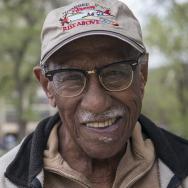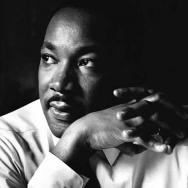Timuel Black, beloved Chicago historian, civil rights activist and University of Chicago alum, died Oct. 13 at his Hyde Park home. He was 102.
Black, AM’54, is being remembered by the University community and across Chicago for his extraordinary life and career: He marched with Martin Luther King Jr., campaigned for Chicago mayor Harold Washington, mentored a young Barack Obama and helped bring the Obama Presidential Center to the South Side.
“Like many others in the University of Chicago community, I was privileged to know Timuel Black,” said Chancellor Robert J. Zimmer. “He was a devoted student and teacher of the history of the South Side, and he lived that history over a remarkable span of 102 years, during which he helped to bring about profound changes. We are grateful for the wisdom that is his enduring gift to the city he loved, and I am personally grateful for our friendship over many years.”
As a speaker, educator and writer, Black captivated audiences in the classroom and across the city for decades. He interviewed hundreds of Chicago residents for his oral history, Bridges of Memory; authored a memoir, Sacred Ground; and regularly gave tours and lectures about his life and career.
In 2012, the University of Chicago awarded Black the William Benton Medal for Distinguished Public Service, honoring him as “one of the most influential civil rights leaders in Chicago history” and “a national voice in the cause of American justice.”
“Timuel Black dedicated his life to helping communities across Chicago, especially on the South Side,” said Derek Douglas, vice president for civic engagement and external affairs at UChicago. “His unparalleled understanding of the area’s history and people made him an outstanding advocate, a trusted counselor and a consummate community partner. He was deeply committed to educating and inspiring young people—a mission that he advanced with the University of Chicago through the creation of the Timuel D. Black Community Solidarity Scholarship.
“Tim was one of the most passionate community leaders of the effort to bring the Obama Presidential Center to the South Side, and his vision was central to that proposal’s success. Even as we mourn his loss, we know his humanitarian spirit will continue to guide us in working toward a bright future for the South Side and beyond.”












 —Prof. Kunle Odunsi
—Prof. Kunle Odunsi
